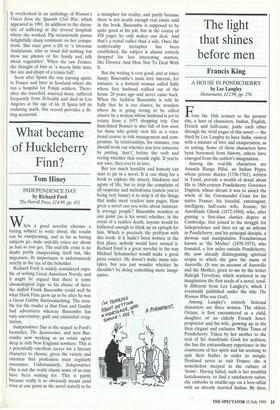What became of Huckleberry Finn?
Tom Hiney
INDEPENDENCE DAY by Richard Ford The Harvill Press, £14.99, pp. 451 When a good novelist chooses a boring subject to write about, the results can be exasperating. and as far as boring subjects go, male mid-life crises are about as bad as you get. The mid-life crisis is no doubt pretty exasperating itself but, like migraines, its importance is unfortunately strictly in the eye of the beholder.
Richard Ford is widely considered capa- ble of writing Great American Novels, and it might be argued that there is some chronological logic to his choice of hero: the dulled Frank Bascombe could well be what Huck Finn grew up to be after he was a Great Gatsby thirtysomething. The trou- ble for the reader is that Finn and Gatsby had adventures whereas Bascombe has only uncertainty, guilt and existential resig- nation.
Independence Day is the sequel to Ford's bestseller, The Sportswriter, and sees Bas- eombe now working as an estate agent deep in rich New England nowhere. This is a potentially excellent career for a literary character to choose, given the variety and emotion that profession must regularly encounter. Unfortunately, Independence Day is not the realty classic some of us may have been waiting for. This is partly because realty is so obviously meant (and even at one point in the novel stated) to be a metaphor for reality; and partly because there is not nearly enough real estate sold in the book. Bascombe is supposed to be quite good at his job, but in the course of 450 pages he only makes one deal. And that's a rental rather than a sale. Once the realty/reality metaphor has been established, the subject is almost entirely dropped for less interesting matters, like Divorce And How Not To Deal With It But the writing is very good, and at times funny. Bascombe's main love interest, for instance, is a fortyish woman called Sally whose first husband walked out of the house 20 years ago and never came back. When the luckless Bascombe is told by Sally that he is too elusive, he wonders where he is going wrong to be called elusive by a woman whose husband is yet to return from a 1975 shopping trip. Our ham-fisted Romeo is also full of bon mots for those who grimly view life as a voca- tional course in risk management and com- promise. In relationships, for instance, you should work out whether you love someone by putting 'don't; before the verb and seeing whether that sounds right. If 'you're not sure, then you're in love.
But too much humility and honesty can start to jar in a novel. It is one thing for a book to explore the misery, blackness and agony of life, but to strip the complaint of all suspense and melodrama (unless you're being very funny) is to strip it of the things that make most readers turn pages. How great a novel can you write about insistent- ly average people? Bascombe wonders at one point (as is his wont) whether, in the event of a sudden death, anyone would be bothered enough to think up an epitaph for him. Which is precisely the problem with this book: if it hadn't been written in the first place, nobody would have missed it. Richard Ford is a great novelist in the way Michael Schumacher would make a great pizza courier. He doesn't make many mis- takes, but you just wonder whether he shouldn't be doing something more imagi- native.


















































 Previous page
Previous page